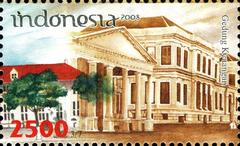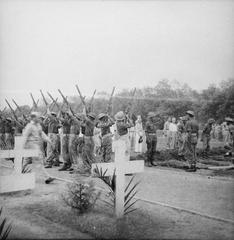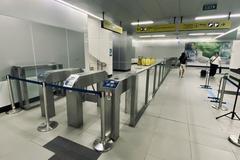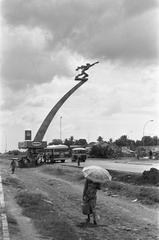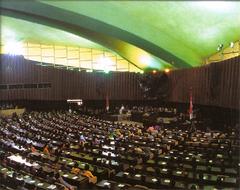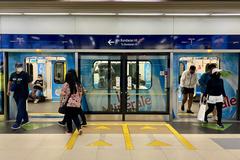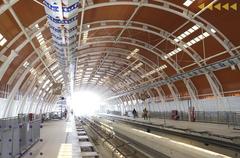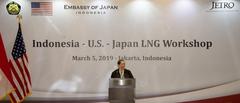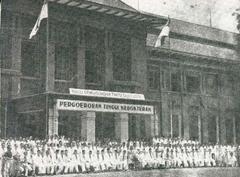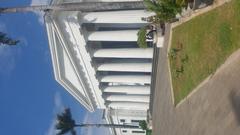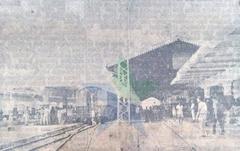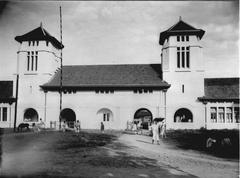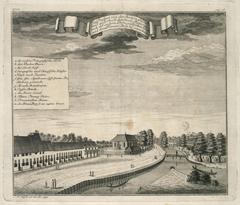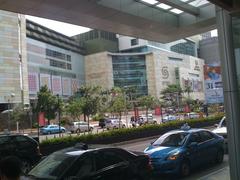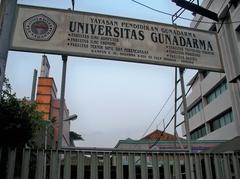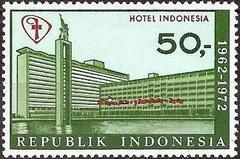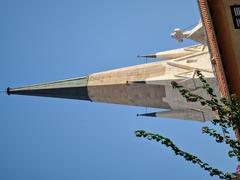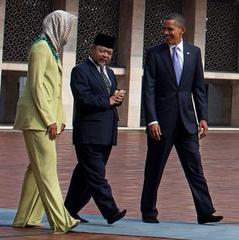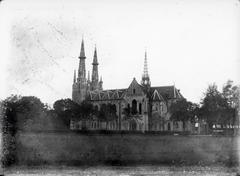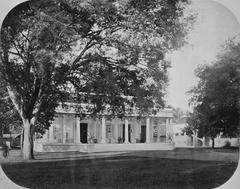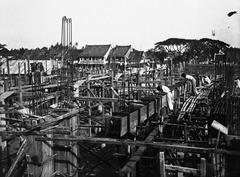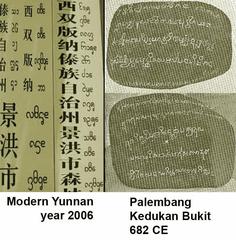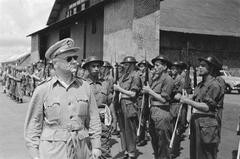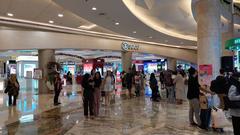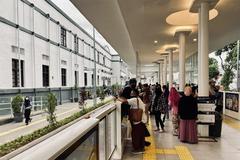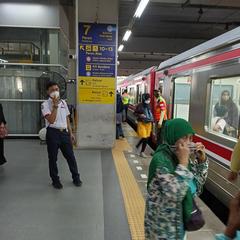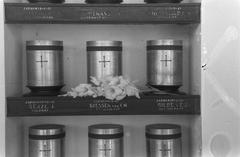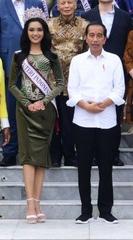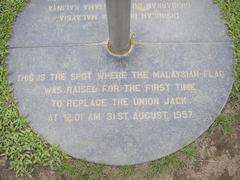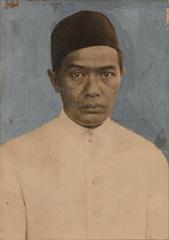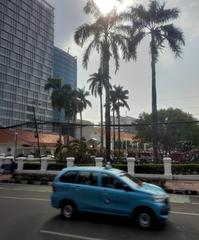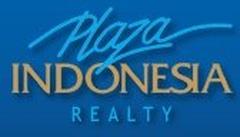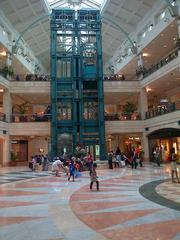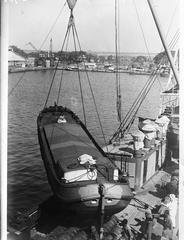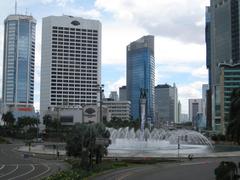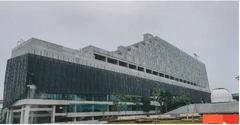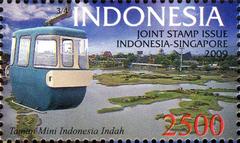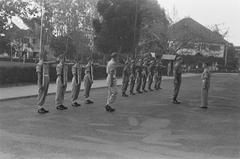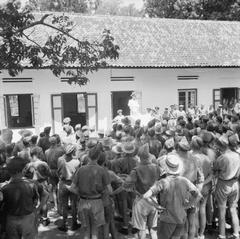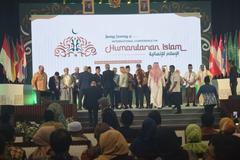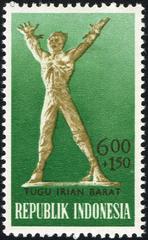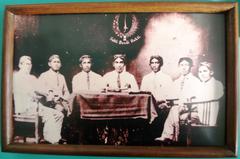
Embassy of South Korea in Jakarta: Visiting Hours, Tickets, and Historical Significance
Date: 04/07/2025
Introduction: A Gateway for Indonesia–South Korea Relations
Visiting the Embassy of South Korea in Jakarta provides a unique insight into the dynamic partnership between Indonesia and South Korea. Since its establishment in 1973, following the official recognition of diplomatic relations, the embassy has become a cornerstone for bilateral cooperation, cultural exchange, and economic development. Initiatives such as the Indonesia-Korea Comprehensive Economic Partnership Agreement (IK-CEPA) exemplify its role in expanding trade and investment opportunities for both nations (Modern Diplomacy; Eurasia Review).
Strategically located in Jakarta’s prominent diplomatic district, the embassy is accessible by public transportation, including TransJakarta, MRT, and ride-hailing services. The modern facility is designed with inclusivity in mind, offering wheelchair access, free Wi-Fi, and attentive staff support. Consular services such as visa applications and passport renewals are efficiently managed, with most processes requiring appointments and benefiting from online pre-registration through the Korea Visa Application Center (Sewa Mobil Korea).
Beyond its administrative functions, the embassy fosters cultural ties through events like film screenings, language courses, art exhibitions, and food festivals, playing a pivotal role in the growth of the Hallyu (Korean Wave) in Indonesia. Scholarships and youth exchanges further strengthen person-to-person connections.
With its prime location near government offices, business districts, and cultural landmarks such as the National Monument (Monas), Istiqlal Mosque, and Jakarta Cathedral, the embassy is a central hub for those seeking to experience the multifaceted relationship between Indonesia and South Korea.
Table of Contents
- Introduction: A Gateway for Indonesia–South Korea Relations
- Historical Evolution and Diplomatic Importance
- Practical Visitor Information
- Cultural and Community Engagement
- Frequently Asked Questions (FAQ)
- Visual Highlights
- Visiting the Embassy: Location, Accessibility, and Nearby Attractions
- Visa Application Process and Consular Services (2025)
- Visiting the National Monument (Monas): Guide for Tourists
- Summary and Final Tips
- References
Historical Evolution and Diplomatic Importance
Establishment and Early Years
After diplomatic ties were formalized in 1973, the South Korean Embassy in Jakarta began as a modest mission focused on establishing economic and cultural links. Early efforts laid the groundwork for robust cooperation in trade, technology, and education (Modern Diplomacy).
Expansion and Present Role
Throughout the 1990s and following the Asian financial crisis, the embassy expanded its focus to include economic diplomacy, political engagement, and large-scale cultural initiatives. Agreements like IK-CEPA continue to drive deeper integration and mutual prosperity (Eurasia Review).
Practical Visitor Information
Location and How to Get There
Address: Jalan Jenderal Gatot Subroto Kav. 57, Jakarta Selatan 12950, Indonesia
Coordinates: 106.833218 (longitude), -6.2390844 (latitude)
(Official Embassy Website)
The embassy is positioned within South Jakarta’s diplomatic and business zone, offering easy access by car, taxi, or public transport. Key surrounding landmarks include the Indonesian Ministry of Foreign Affairs, several other embassies, Sudirman Central Business District (SCBD), and Mega Kuningan.
Visiting Hours and Appointments
- Office Hours: Monday to Friday, 9:00 AM – 4:30 PM (excluding Indonesian and South Korean public holidays)
- Consular Services: By appointment, including visa and passport services
- Visa Applications: Submit through the Korea Visa Application Center, with online pre-registration available (Sewa Mobil Korea)
Ticketing and Entry
- No tickets are required for general embassy visits.
- Valid photo ID is needed for entry and security checks.
- Event-specific tickets may be announced via the embassy’s official website and social channels.
Accessibility and Amenities
- Wheelchair-accessible entrances and ramps
- Free Wi-Fi in public areas
- Helpful staff for visitor assistance
Cultural and Community Engagement
The embassy actively promotes Korean culture through:
- Film Screenings: Showcasing contemporary Korean cinema
- Language Courses: Korean language classes for the public
- Art Exhibitions and Festivals: Highlighting Korean art, music, and cuisine
- Scholarships and Youth Exchanges: Strengthening academic and cultural ties
These initiatives have contributed to the growing presence of Korean culture in Indonesia and deepened people-to-people relationships.
Frequently Asked Questions (FAQ)
Q: What documents are required for a Korean visa application in Jakarta?
A: Requirements include a valid passport, application form, recent photographs, proof of financial means, and a travel itinerary. Specifics depend on visa type; check the KVAC website for details.
Q: Can I visit the embassy without an appointment?
A: General inquiries are accepted during office hours, but consular services require appointments.
Q: Is parking available?
A: On-site parking is limited; public transport or taxis are recommended.
Q: Where can I find updates on embassy events?
A: The embassy’s website and social media pages provide announcements and schedules.
Visual Highlights
The embassy features modern architecture with Korean design influences. Visitors can find visual guides and maps on the embassy’s website to assist in planning their visit.

Visiting the Embassy: Location, Accessibility, and Nearby Attractions
Public Transportation
- TransJakarta Busway: “Gatot Subroto LIPI” stop on Corridor 9, a short walk from the embassy
- MRT Jakarta: “Bendungan Hilir” station (approx. 2.5 km away)
- Commuter Rail: “Sudirman” and “Manggarai” stations (secondary transport required)
- Ride-hailing/Taxis: Blue Bird, Gojek, Grab are reliable options
By Private Vehicle
Accessible via major roads; limited visitor parking, so early arrival is advised.
Accessibility for Persons with Disabilities
The embassy provides ramps and accessible entrances. Jakarta’s infrastructure can be inconsistent for those with mobility needs, so plan in advance.
Security and Entry
Standard security procedures apply: bag checks and ID verification. Always bring a government-issued photo ID.
Nearby Landmarks
- Government & Diplomatic: Other embassies (Australia, UK, Singapore), Ministry of Law and Human Rights
- Business & Shopping: SCBD, Mega Kuningan, Plaza Semanggi, Lotte Shopping Avenue
- Cultural & Religious: National Monument (Monas), Istiqlal Mosque, Jakarta Cathedral
- Recreation: Taman Suropati, Gelora Bung Karno Sports Complex
- Accommodation: Hotels (Ritz-Carlton, JW Marriott), budget options, and serviced apartments
Practical Tips
- Traffic: Allow extra time during rush hours (07:00–10:00, 16:00–19:00)
- Dress Code: Smart casual recommended
- Safety: The area is generally secure, but remain vigilant
Visa Application Process and Consular Services (2025)
Overview
Indonesian citizens must apply for a visa before visiting South Korea. The embassy processes all visa types and provides consular assistance for South Korean nationals in Indonesia.
Types of Visas
- Tourist (C-3)
- Business
- Family Visit
- Student
- Work
- Transit
Application Requirements
- Completed form, valid passport, photos, financial proof, itinerary, flight reservation, and insurance. Additional documents may be needed based on visa type.
Application Methods
- In-Person: Required for long-term visas
- Online Submission: Available for some short-term visas
Processing Times and Fees
- Processing: 15 working days (in-person), 3–5 days (online, if eligible)
- Fees: Vary by type; K-ETA is not available for Indonesians
New Entry Requirement
Effective February 24, 2025, all foreign nationals must submit an e-Arrival Card before traveling to South Korea.
Emergency and Consular Assistance
The embassy assists Korean nationals with lost passports, legal matters, and emergencies.
Useful Resources
- Korean Visa Portal
- K-ETA Application Portal
- KoreaTravelEasy Visa Guide
- South Korean Embassy in Jakarta
Visiting the National Monument (Monas): Guide for Tourists
Introduction
Monas is Jakarta’s iconic symbol of independence, featuring a 132-meter obelisk and an observation deck with panoramic city views.
History
Built between 1961 and 1975, Monas commemorates Indonesia’s struggle for independence. The monument’s golden flame represents the nation’s spirit.
Visiting Hours and Tickets
- Hours: 8:00 AM – 4:00 PM daily
- Tickets:
- Adults: IDR 15,000
- Children (6–12): IDR 10,000
- Free for children under 6 and seniors over 65
- Official Jakarta Tourism Website
Getting There
- TransJakarta: Monas or Gambir stations
- Commuter Line: Gambir Station
- Taxi/Ride-Hailing: Convenient for first-time visitors
Tours and Activities
- Guided tours via Jakarta Tourism Office
- Observation deck access
- Nearby attractions: Merdeka Square, National Museum, Jakarta Cathedral
Accessibility
- Wheelchair ramps and elevators
- Public restrooms, seating, food stalls, and souvenir shops
Visitor Tips
- Arrive early to avoid crowds
- Wear comfortable clothing and sun protection
- Photography is allowed except inside museum exhibits
Summary and Final Tips
The South Korean Embassy in Jakarta is a dynamic hub for diplomatic, cultural, and economic engagement between Indonesia and South Korea. Since 1973, the embassy has adapted to changing landscapes, championing initiatives like IK-CEPA and providing efficient consular services for visitors and nationals (Modern Diplomacy; Eurasia Review; Sewa Mobil Korea).
With its accessible location, visitor-friendly amenities, and vibrant cultural programming, the embassy welcomes diverse audiences. For up-to-date information on services, events, and travel, consult the official embassy website and follow their social channels. Tools like the Audiala app provide additional support for planning your embassy visit and exploring Jakarta’s attractions.
References
- Modern Diplomacy: Miles of Hope – The Changing Face of Indonesia–South Korea Relations
- Eurasia Review: South Korea–Indonesia Bilateral Relationship at the Crossroads (Op-Ed)
- Sewa Mobil Korea: Requirements and How to Apply for a Korean Visa in 2025
- Official Embassy Website of the Republic of Korea in Indonesia
- Korean Visa Portal
- K-ETA Application Portal
- KoreaTravelEasy Visa Guide
- Jakarta Public Transport Guide
- National Monument (Monas) - Wikipedia

